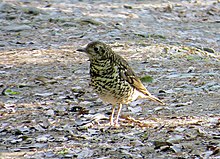| Amami thrush | |
|---|---|

| |
| Conservation status | |
 Near Threatened (IUCN 3.1) | |
| Scientific classification | |
| Domain: | Eukaryota |
| Kingdom: | Animalia |
| Phylum: | Chordata |
| Class: | Aves |
| Order: | Passeriformes |
| Family: | Turdidae |
| Genus: | Zoothera |
| Species: | Z. major |
| Binomial name | |
| Zoothera major (Ogawa, 1905) | |
| Synonyms | |
| |
The Amami thrush (Zoothera major) is a member of the thrush family Turdidae. It is endemic to the islands of Amami Ōshima and Kakeroma island in the northern Nansei Islands of Japan.
Description
This large, heavily patterned thrush is similar in appearance to the scaly thrush, to which was considered a subspecies. It has warm olive-brown to buff upperparts and whitish underparts with heavy black scaling. It has twelve tail feathers. The scaly thrush is smaller and has fourteen tail feathers. It has a cheerful song similar to the Siberian thrush. The Amami thrush ranges in length from 29 to 31 cm (11 to 12 in) and weighs approximately 172 g (6.1 oz). Among standard measurements, the wing chord is 16.4 to 17.3 cm (6.5 to 6.8 in), the bill is 3.1 to 3.3 cm (1.2 to 1.3 in) and the tarsus is 4.1 to 4.5 cm (1.6 to 1.8 in).
Behaviour and ecology
Its breeding habitat is mature subtropical broadleaved evergreen forest around humid valleys. Its diet includes invertebrates and fruit. It breeds in May and June, laying 3-4 eggs.
Status
The breeding population is estimated by Amami Ornithologists' Club (NPO, Japan) all over the island every late March since 1999.
References
- BirdLife International 2017. Zoothera major (amended version of 2017 assessment). The IUCN Red List of Threatened Species 2017: e.T22708496A119560364. https://doi.org/10.2305/IUCN.UK.2017-3.RLTS.T22708496A119560364.en. Downloaded on 20 August 2019.
- Peter Clement (2001) Thrushes. Princeton University Press. ISBN 978-0691088525
External links
| Taxon identifiers | |
|---|---|
| Zoothera major | |
This article about a thrush is a stub. You can help Misplaced Pages by expanding it. |